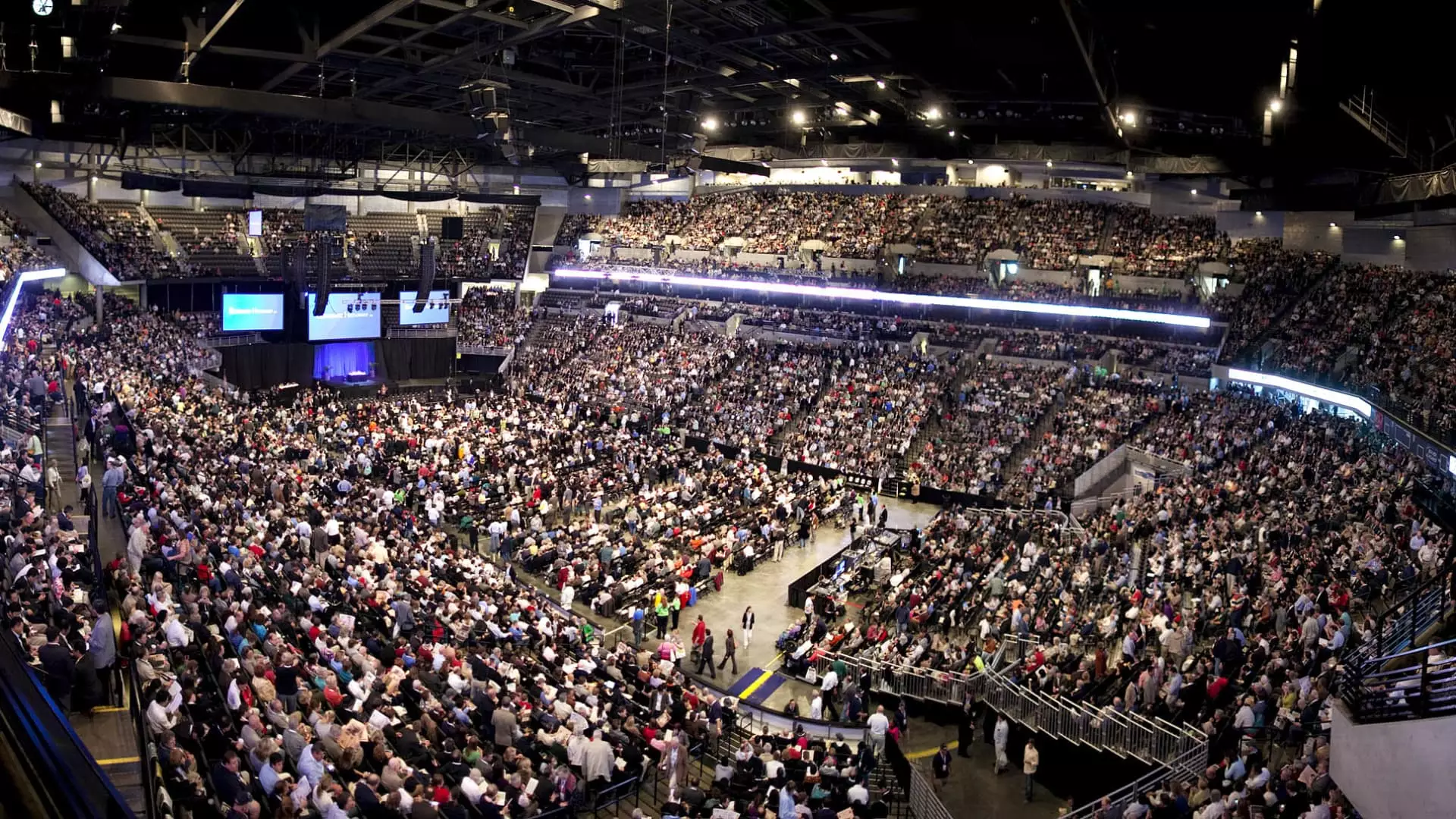Berkshire Hathaway’s annual meeting has undergone a remarkable metamorphosis over the past six decades, shifting from a humble gathering of twelve attendees to a massive congregation of almost 40,000 enthusiastic participants. Initially the helm of a struggling textile business in Massachusetts, Warren Buffett transformed this company into a colossal investment powerhouse. This transformation speaks volumes about Buffett’s business acumen, but it also raises questions about the very nature of capitalism in modern society, especially given the growing economic inequalities and crises we face today.
While the early meetings were characterized by a small circle of investors seeking guidance from Buffett, today’s event, often dubbed the “Woodstock for Capitalists,” highlights the allure of celebrity culture and its impact on the financial sector. Strikingly, the annual meeting has transitioned from a platform for investment strategies to an elaborate spectacle packed with entertainment, product showcases, and even communal runs. Are we losing the essence of smart investing and strategic dialogues amid this wave of extravagance?
The Absence of Charlie Munger
This year’s meeting marks a poignant moment in Berkshire’s history, being the first without the sharp intellect of Charlie Munger, Buffett’s long-time partner who passed away in 2023. Munger’s absence is more than just a seat left unfilled; it symbolizes the end of an era in which two co-pilots navigated the corporate world’s treacherous waters with wisdom and pragmatism. While Greg Abel, poised to step into Buffett’s shoes, joined him on stage, one cannot help but wonder whether he can fill the gap left by Munger’s incisive thoughts and critical discourse.
The dynamic duo delivered a philosophy of business that transcended mere profit-making, focusing instead on ethical practices and long-term wealth accumulation. Without Munger, is the future of Berkshire Hathaway simply an operation driven by numbers, devoid of the profound moral underpinnings that once characterized its governance?
The Business of Connection
Drawing thousands to Omaha, the Berkshire meeting fosters a unique camaraderie among attendees, who often liken it to a spiritual pilgrimage. The shared experience of lining up for hours and engaging in conversation about stocks, strategies, and life creates an invigorating atmosphere. However, it begs the question: Is this communal experience truly about investment enlightenment, or is it merely another form of spectacle feeding the cult of personality surrounding Buffett?
As Adam Mead eloquently points out, the atmosphere feels almost religious. But within this metaphorical church, are we fostering an environment that celebrates knowledge, or are we inadvertently glorifying an individual’s wisdom, thus limiting critical discourse to the confines of Buffett’s ideals? This glorification runs the risk of stifling innovation and critique, vital elements necessary for any thriving investment community.
Charitable Ventures and Opportunism
Among the many events this year, the inclusion of a charity auction exemplifies the dual nature of capitalism: generosity and self-interest. The proceeds from the auction to benefit the Stephen Center—a vital organization assisting homeless youth—illustrate a noble effort on the part of Berkshire Hathaway. However, one can’t ignore the underlying opportunism. The act of tying corporate performance to philanthropy is increasingly becoming a popular strategy for businesses seeking to enhance their public image.
While contributing to societal needs is commendable, such actions can also be viewed through a critical lens. Is Berkshire Hathaway genuinely interested in social welfare, or are these moves a strategic maneuver to bolster its public relations? This complexity surrounding corporate philanthropy in an age where crises are rampant raises ethical implications about the motivations behind such agendas.
The Future of Investing Culture
Ultimately, as Berkshire Hathaway continues to grow and evolve, we must interrogate what lies ahead for the investment culture it represents. The complexities of contemporary economics—the rise of new asset classes, the influence of social media, and shifting global trends—demand a new discourse. As the world’s problems become increasingly intertwined, will the focus of the annual meeting shift back towards investment strategies that prioritize social responsibility and sustainability?
The “magic” of the event, as described by frequent attendees, may be enchanting, yet it also reflects a nostalgia that may not serve our current economic climate. As we celebrate Buffett’s legacy, we also have the responsibility to advocate for a future where investment is not merely about wealth accumulation, but about contributing positively to the world. This meeting, and others like it, should evolve into platforms for progressive dialogues that acknowledge the volatility of capitalism while advocating for more humane economics.

Leave a Reply